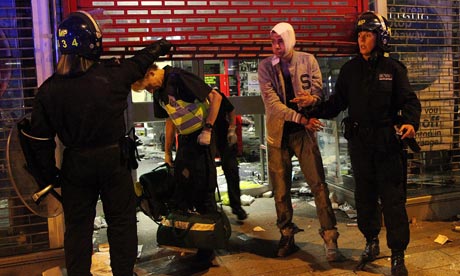UPDATES
Libya joins in “tit-for-tat” on UK riots as Israel offers advice
August 11, 2011 | Daniel Meyerowitz-Katz

Perhaps taking their cue from Iran yesterday, the Libyan Government has released the following statement regarding the London riots (via Reuters):
“Cameron has lost his legitimacy and must go… after the massive popular protests that reject him and his government, especially after the violent police repression unleashed by his government against peaceful protesters… to force the British people to accept a government it rejects… The international community (should) not stand with arms folded in the face of this gross aggression against the rights of the British people, who are demanding their right to rule their country.”
If this statement sounds a little familiar, that may be because it raises a memory of the statement that the G8 released on Libya in March, which Cameron is believed to have been largely responsible for.
We stress the need to hold to account those responsible for attacks on civilians… Qadhafi and the Libyan government have failed to fulfil their responsibility to protect the Libyan population and have lost all legitimacy. He has no future in a free, democratic Libya. He must go.
… We are appalled by the deaths of many peaceful protesters as a result of the sweeping use of violence in Syria as well as by repeated and serious violations of human rights. We call on the Syrian leadership to immediately stop using force and intimidation against the Syrian people and to respond to their legitimate demands for freedom of expression and universal rights and aspirations.
Of course, the comparison between what eventually became a civil war in Libya, including a NATO intervention against Gaddafi, with widespread riots in the UK that are believed to be apolitical opportunism by petty criminals, is absurd. The UK riots are certainly not an example of repressed people acting out against despotism.
Meanwhile, a senior Israeli police official has accused the British police of being completely unprepared for the scenario that unfolded. As reported by Yaakov Lappin for The Jerusalem Post:
“If I’m commanding police forces during a riot, and I see rioters breaking into stores and emptying them out, and setting parked cars on fire, the only order I know to give is to storm the rioters, take them into custody, and use riot dispersal means if necessary,” said Micky Levi, who commanded the Jerusalem police district from 2000 and 2003.
… “Police in London were caught off guard by the scope of the violence. If you are not on guard and wound up like a spring – physically, mentally, and operationally, your organization goes to sleep,” Levi said.
Other Israeli officials were less critical, but still commented negatively on the length of time that it took London’s Metropolitan Police to call in additional forces. Read the full article for more.
Finally, yesterday’s post ended by noting an encouraging lack of racial tension in the riots and hoping that the situation would not deteriorate in this regard. While this has been the trend for the most part, the ugly spectre of racism does seem to have emerged in some isolated incidents, the most tragic of which resulted in the alleged murder of three Muslim youths:
With police nowhere to be seen, the Muslims of Dudley Road armed themselves with bricks and stones, clubs and cricket bats to fend off carloads of marauding gangs.
Their vigilante stand in Birmingham’s west end saved a humble row of family-run shops and a red-brick mosque from the looters’ grasp – but at a terrible cost.
A carload of rioters sped into a fleeing crowd of shop defenders, witnesses said, hurling three young men into the air and killing amateur boxer Haroon Jahan, 21, and brothers Shazzad Ali, 30, and Abdul Musavir, 31.
“We all had stones in our hands. But we had no defense to stop a car. They revved their engines and drove right at us as fast as they could,” Mohammed Ibrahim, 23, told The Associated Press. “These black men deliberately tried to kill us all.”
(via AP)
What is remarkeable, however, is that British immigrants have often emerged as the heroes of the widespread mayhem. As Cristina Odone writes in The Telegraph (UK), racist thugs are being shown up by patriotic migrants.
The response to the riots should humble these sceptics. As a cluster of youths stood guard outside the mosque in Whitechapel, Josie Ensor, a Daily Telegraph reporter, asked if they had been moved to defend their own people. They shook their head: they wanted to protect their country, not just their community.
Their patriotism, which echoes that of the Poles in Ealing, is striking, especially in an area where the BNP and English Defence League boast a growing presence. But their actions teach us other lessons, too. Coverage of the riots has repeatedly focused on the damage to the “community”. This is ironic, given the total disregard for neighbours and local businesses that the mob has shown: there’s no such thing as community for the owner of the deli in Dalston who has witnessed the destruction of her family-run shop and the terrorising of her elderly father. Social ties of duty, respect, trust – if they still existed – have gone up in smoke. The only community the rioters belong to is a virtual one, which allows them to communicate the location and timing of their next rampage through websites and mobile phones.
If anything positive can come from these deplorable events, it is perhaps a greater understanding of the people who really contribute to British society and the true nature of the far-right extremist element that is growing not only in Britain, but across Europe.
Daniel Meyerowitz-Katz
Tags: Israel





